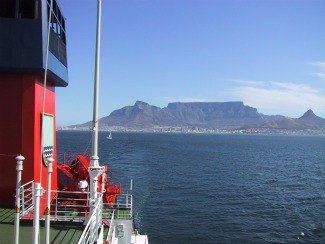Water currents of South Africa could stabilise climate in Europe

One of the ocean currents which particularly interests oceanographers and climatologists is the Gulf Stream. This current, originating in the Gulf of Mexico, transports enormous amounts of warm tropical waters to the North Atlantic and is the cause of Europe's habitable climate. Climate predictions point to the fact that this will change in the future and affect especially the climate in countries of the Mediterranean region, with more dry spells. As global warming progresses, the North Atlantic will receive more precipitation and a greater amount of water from the melting of glaciers in Greenland, thus reducing the salinity of ocean water and weakening the Gulf Stream’s effects.
The article published in Nature describes an alternative approach which suggests that flows from the Indian Ocean to the South Atlantic, near the tip of Africa, also are important in relation to future current systems in the North Atlantic.
The Agulhas Current, located in the southwest of the Indian Ocean, transports high density salt water to the southern tip of Africa, where part of it escapes to the South Atlantic, contributing to the strength of the global circulation of this ocean. The study describes how this inflow of salt water from the Indian Ocean can compensate the decrease in salinity in the North Atlantic and therefore stabilise the Gulf Stream and the climate in Europe. These processes have been simulated using computational climate models.
The article reviews information available until now and enumerates the steps which must be taken with the aim of carrying out a better assessment of the processes involved in this current system. To demonstrate the dynamics of the Agulhas Current, its sensitivity to climate change and the way it transmits its signals to the North Atlantic, researchers point out the need to combine long-term studies on temperature variation and salinity of the Agulhas Current, analyses on climate changes in the past and detailed computer simulation models.
The existence of connections between the Agulhas Current and Europe's climate has been the focus of study these past six years of the research group directed by Dr Rainer Zahn.
The authors of the research article are members of a consortium of marine scientists from United States, Germany, The Netherlands, United Kingdom and Spain working together with the objective of studying the effects of the Agulhas Current on regional and global climates. This group forms part of the Scientific Committee on Oceanic Research (SCOR), member of the International Council for Science. Other member institutions include the US National Science Foundation, the World Climate Research Programme (WCRP), the International Association for the Physical Sciences of the Oceans (IAPSO) and the International Marine Global Change Study (IMAGES).
References
"On the role of the Agulhas system in ocean circulation and climate". Lisa M. Beal, Wilhelmus P. M. De Ruijter, Arne Biastoch, Rainer Zahn and the members of SCOR/WCRP/IAPSO Working Group 136. Nature, 28 April 2011.

